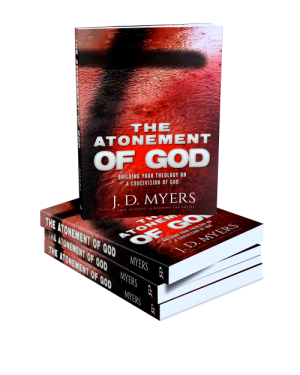My new book on the Non-Violent Atonement was released yesterday. It is called The Atonement of God, and you can (#AmazonAdLink) buy it on Amazon.
The book begins with a summary of three views on the atonement, and then I define and defend a fourth view, which is a Non-Violent view of the atonement.
The basic idea of a Non-Violent view of the atonement is that God did not want or need the death of Jesus in order to offer grace or forgiveness of sins. Yes, Jesus died a violent death, but it was not to satisfy an angry God. Instead, Jesus died for completely different reasons (which are explained in the book).
(#AmazonAdLink)  Following this explanation of the Non-Violent atonement, I provide 10 areas of theology that are affected by the Non-Violent atonement.
Following this explanation of the Non-Violent atonement, I provide 10 areas of theology that are affected by the Non-Violent atonement.
Here they are with a brief summary of each.
1. The Non-Violent Atonement Brings Continuity to the Life of Jesus
Everything Jesus did was Non-Violent. Yes, Jesus was aggressive, but He never harmed another human being, or encouraged others to do so. A Non-Violent atonement helps us see that Jesus what Jesus accomplished on the cross was right in line with the way He lived the rest of His life as well.
2. The Non-Violent Atonement Reveals the Truth about God
Does Jesus fully reveal God to us or not? Jesus claimed that He did, and other New Testament writers believed so as well John 1:14, 18; 14:9-11; 2 Cor 4:4; Php 2:6; Col 1:15; Heb 1:2-3.
But if God is violent, and Jesus does not reveal the violent side of God to us, this means that Jesus is a faulty revelation of God. The better option is to believe that Jesus does reveal God to us, and God looks just like a Non-Violent Jesus.
3. The Non-Violent Atonement Reveals the Truth about Scripture
But if God is Non-Violent like Jesus is Non-Violent, then what are we to do with all the violent portrayals of God in Scripture? I do not write them off as hopelessly in error. I continue to hold to an inerrantist position on Scripture, and argue that the violent portrayals of God in Scripture accurately reveal the heart of man instead of the heart of God.

4. The Non-Violent Atonement Reveals the Truth about Sacrifice
If Scripture reveals the heart of man instead of the heart of God, then this helps us make sense of the conflicting statements in Scripture about sacrifice. God does not want sacrifice and never did. We wanted it.
5. The Non-Violent Atonement Reveals the Truth about Humans
The truth from Scripture is that God is not violent, but humans are. We are the violent ones. And we justify our violence by blaming it on God.
6. The Non-Violent Atonement Reveals the Truth about Sin
The reason God tells us not to sin, is not because He is angry at us about sin, or will be angry with us if we sin. No, God tells us not to sin because in hurts and damages us. He loves us and does not want to see us hurt.

7. The Non-Violent Atonement Reveals the Truth about Forgiveness
God’s forgiveness has always been completely free. There have never been any conditions for God’s forgiveness. God does not need sacrifice in order to extend forgiveness. He simply forgives, just as Jesus does on the cross.
8. The Non-Violent Atonement Reveals the Truth about Justice
Christians often teach that “God is a God of love and forgiveness, but He is also a God of justice.” This chapter shows how wrong that idea is. Unconditional love and forgiveness are incompatible with justice. You can have one or the other, but you cannot have both.
9. The Non-Violent Atonement Reveals the Truth about Violence
As we begin to bring the book to a close, this chapter shows why God inspired a book (the Bible) which is so full of violence. The reason is because violence is such a huge human problem, God wanted to reveal that we humans are the source and cause of violence. We are in desperate need of this revelation from God, which is why God gave us the Bible.
10. The Non-Violent Atonement Reveals the Way to Peace
But if the violence is the problem, then peace is the cure. The Bible doesn’t just tell us that we are violent, but also shows us the way to peace, which is the way of love and forgiveness.
I am really excited about this book. Studying about the Non-Violent atonement and writing this book transformed my theology, and I know that if you read it, your life and theology will also be transformed. (#AmazonAdLink) Get your copy today on Amazon.
 How can a God who says "Love your enemies" (Matthew 5:44) be the same God who instructs His people in the Old Testament to kill their enemies?
How can a God who says "Love your enemies" (Matthew 5:44) be the same God who instructs His people in the Old Testament to kill their enemies?
These are the sorts of questions we discuss and (try to) answer in my online discipleship group. Members of the group can also take ALL of my online courses (Valued at over $1000) at no charge. Learn more here: Join the RedeemingGod.com Discipleship Group I can't wait to hear what you have to say, and how we can help you better understand God and learn to live like Him in this world!




Hey Jeremy. At first blush, I am tempted to think you are advocating universal salvation. I am, BTW, sympathetic with universalism, although not entirely convinced. Karl Barth once said (I’m paraphrasing from memory): “The great mystery is not that some are saved; it is that some are lost.” He denied he was a universalist, but it was a difficult line for him to hold because he had such a strong view of Christ’s death for our sins that he could not find a way to understand how it could not cover all humans.
I guess I’ll just have to fork out some money and by your dang book :).
I am not a universalist by any stretch of the imagination. Though I love that quote from Barth.
This book probably won’t answer your questions though regarding what I believe about the eternal destiny of unbelievers.
Just off the cuff observations corresponding to your numbering:
-1- I agree Jesus was not violent when on earth. First, it was not Jesus’ time to act in any violent way, as judgment against men for their sin might require. And, second, sinful men will experience an eternal violence before the “presence of the Lamb,” which, although one may argue Jesus was not himself executing the violent judgment, nevertheless, at the least, he seems to be portrayed as overseeing it (Rev 14).
-2- Again, Jesus’ purpose on earth was not to exercise judgement. He was to exhibit the divine mercy. Also, Jesus reveled the truth about God, not everything.
-3- The children who mocked Elisha were violently punished by God. I don’t think the Bible, as in this example, totally exempted God from acts of violence. Also, I don’t see how the violence of the bears exhibits the hearts of men.
-3- It seems the people of Canaan were all to be exterminated. Not only would such an act as God commanded require violence – you can’t obey a command to kill someone in a non-violent or peaceful way – what was commanded by God was genocide! In any case, there is no contradiction between Testaments regarding the character of God or between the NT claim that Jesus reveals the God as shown in the OT.
-4- I do not perceive any conflicting statements in Scripture about sacrifice. I can agree God does not want sacrifice and never did, while simultaneously affirm he requires blood sacrifice for sin. That God committed violent acts does not necessarily mean God, as to his character and being, is violent.
-5- As in the above example (#2), I fail to see how the acts of violence by bears portray men as violent (not that I deny man is violent).
-6- It can be argued that God’s primary reason for not wanting us to sin is because he loves us and not because he is angry but, apparently, the Bible portrays God – unless such scriptural references are claimed to be read as anthropomorphisms – responding in anger because of our sins.
-7- Although forgiveness is free, the Bible everywhere suggests it is not unconditional, at least, as far as requiring faith on man’s part. Although the Cross is an unconditional act for God simply forgives just as Jesus held out forgiveness as he lay bleeding on the cross. The Bible portrays the Cross as a substitutionary atonement, an atonement made without conditions.
-8- As such, unconditional love and justice are not incompatible.
-9- Again, how do the bears that attacked Elisha, an act, which if nothing else God allowed, “reveal that we humans are the source and cause of violence.”
-10- The way is “love and forgiveness” but the divine love and forgiveness expressed in men through the ministry of the Holy Spirit, which can be provided only by the unconditional act of the atonement by Christ and the conditional act of repentance by men as sinners.
I make these comments based solely on your online article here. I will by the book and provide a review as I am able. However, at this time, it seems to me that your positions here are flawed.
Great post Nelson:
you wrote:
That God committed violent acts does not necessarily mean God, as to his character and being, is violent.
100% correct, but Jeremy can’t accept this. He likes to ignore context, focus on a couple/ few acts in the OT, present those acts in the most unfavorable light possible, then ATTACK that straw man presentation of the OT God in order to present a ‘culturally relevant,’ politically correct version of Jesus as a pacifistic flower child singing Kumbaya 24-7.
I am currently working on teaching through every verse of the Bible. I plan to be done in about 560 years. At that point, you can read it and see if I have ignored verses and the context of those verses. I thought about posting the 400,000+ words I have written so far in this one single blog posts, but … well … who would read it?
As NT Wright says, the problem with theology is that you have to say everything all the time or else someone will think you’ve deliberately left something out.
Just because I don’t deal with every single OT text in this one blog post doesn’t mean I’m ignoring it.
Jeremy,
In a vacuum, this is a fair point, but in my opinion it misses the point I’m making. There’s a difference between ‘dealing with every single OT text’ and repeatedly and consistently omitting crucial, indispensable facts that by their omission completely change the message.
Ie. Someone could say that God commanded Abraham to sacrifice His son, and thus taught child sacrifice. Let’s say they stopped there, then someone criticized them for leaving important facts out(ie. God stopped Abraham before he did it etc.). And let’s say in response they used your defense, that they can’t include every single OT text.
So, of course we don’t want every single OT text, but I wish you wouldn’t omit the ones that by their omission, change the meaning of the text.
I won’t respond point by point. But much of what you think I am saying in these points is not what I argue at all in the book. Also, if you believe in Penal Substitution, you probably won’t like the book.
Since you bring up the bears attacking children in your comment several times, let me ask you… If some children today were out playing in the woods and they got attacked by bears, and then a pastor said that those children got attacked by bears because they were not respectful toward him, what would you think about this incident? Would you think this pastor was accurately portraying the heart of God toward those children, or would you think the pastor was actually revealing what was in his own heart?
Obviously, bears attacking children do not reveal the heart of mankind. But the explanation we provide for why those bears attacked children DOES reveal the heart of mankind.
I apologize for misunderstanding your comments in relation to the book but all I had were what you stated on this blog. My bad…
As far as the bears, we’re not talking about the present time, we’re talking about the OT narrative. And the issue is not the attitude of the children but the attitude of God towards the children or, maybe the heart of God towards the heart/behavior of the children.
In any case, I’ll get your book and respond from there with a review as soon as I can. Thanks for the response.
Jeremy wrote:
Does Jesus fully reveal God to us or not? Jesus claimed that He did, and other New Testament writers believed so as well…
Seems like you’re playing with the edges of semantic ranges here to maybe imply something that the scriptures don’t imply. Yes, scriptures teach that Jesus is the exact representation of His nature. I don’t think after reading the gospels or the New Testament, we’ve mastered comprehension of God, that there’s nothing more to learn about Him, that there’s no more mystery. I think we need to be careful before we create an image of what we desperately want God to be and find verses to fit that image into.
John, part of Jesus’ inner circle had this perspective:
John 21:25
Now there are also many other things that Jesus did. Were every one of them to be written, I suppose that the world itself could not contain the books that would be written.
Hmm….did the gospels reveal 100% of everything about God? Hmm…..it seems like these verses say that there are so many other things about God no recorded in the gospels, that the world couldn’t even contain the books that would be written if they were recorded….hmm…..
Jeremy wrote:
I do not write them off as hopelessly in error. I continue to hold to an inerrantist position on Scripture, and argue that the violent portrayals of God in Scripture accurately reveal the heart of man instead of the heart of God.
Your view of scripture makes the Bible no more inspired than Mein Kampf by Adolf Hitler. I know people throw around ‘Hitler’ flippantly these days, just as a casual insult to put down anyone they disagree with(ie. in politics), but in this instance there’s no exaggeration. By your standard of judging, Mein Kampf , Das Capital, heck, maybe even the writings of Anton Lavey would ALSO be included in Jeremy’s canon because it ‘accurately reveals the heart of man instead of the heart of God.’ The trick?
The other big problem is, that’s not the way scripture presents itself. It doesn’t say, ‘Here are the erroneous thoughts of man and his faulty view of God.’ NO, it says, ‘Thus saith the Lord.’ If we can’t trust what the prophets say, why should we accept what the apostles say. I know, because Jeremy takes a salad bar approach to scripture and theology. He says, I want some tomatoes and onions on my theological salad, but I hate mushrooms and green peppers, so I’ll toss those. He does this by, in effect, claiming that the OT is the word of Man instead of the Word of God.
Jeremy wrote:
God does not want sacrifice and never did. We wanted it.
I tell you what, the more I read Jeremy, the more he sounds 100% just like Marcion of Sinope. I don’t believe in reincarnation, but if I did, I’d be convinced that you were the reincarnation of him. Yeah there are a few differences in other areas, but your view of the Jews, the God of the OT, and rejection of what the prophets said about God, and the presentation of God in the OT, you two are like peas in a pod.
Mein Kampf? Marcion? Salad bars? That’s not fair to salad bars.
I like salad.
Look, even though you disagree, this is no reason to fight unfairly. Only people who cannot refute others resort to name-calling.
You are a smart guy. I believe you could probably make some good points against what you think are my faults. But don’t fill up my comment section trying to do it. Instead, here is what you should do:
1. Start your own blog. It’s free on WordPress.com or Blogger.com.
2. Write a bunch of posts refuting me using exegesis, research, logic, and theology.
The important thing is that we understand the character of God
Jeremiah 9:23–Thus saith Yahweh, Let not the wise man glory in his wisdom, neither let the mighty man glory in his might, let not the rich man glory in his riches;
24but let him that glorieth glory in this, that he hath understanding, and knoweth me, that I am Yahweh who exerciseth lovingkindness, justice, and righteousness, in the earth: for in these things I delight, saith Yahweh.
Jeremy I have bought your book and are halfway through it. I find it very thought provoking and it challenges my view of the atonement and more importantly it tells me where it came from…. Constantine and Calvin. Both were not very nice people. I also find it importnat to realise the early church held a different view of the atonement in my understanding. I also like your recommendtion to use the lens of Jesus CHrist from the moment he was born right through to His resurrection as a way of understanding the new and old testiments. I will no doubt have questions I would like to ask you once I have finished your book. Your book helps me with my journey out of religion into being what Christ would like me to be each day. I now realise ones view of the atonement of Christ, influnences what that may look like. Blessings
Thank you Grahame! I would be happy to try to answer questions that come up. Just let me know!
Thanks for that Jeremy. I will send them through once I have finished reflecting on the issues and biblical themes you raise in your book. I would say to any person commenting on your 10 Ways the Non-Violent Atonement Changes Your Theology blog, to read your book first (its not an expensive purchase) before launching into any detailed discussion or disagreement.It answers many of the potential concerns people have and gets the reader to reflect very strongly on what they have been taught about the atonement and to put on a new set of glasses when reading scripture. I have no doubt historical politics played a big part in how the institutional church portrayed God and His Son, often with a view to control what we believe, say and do. Today is no different it seems hence the mass exodus from traditional church. All Jeremy is doing is asking us to open our eyes to our historical beliefs challenging them through scripture and history.
Hi Jeremy, Ive finished your book. A great read to say the least. Reading Christian books has not been one of my strong points (hang over from too much study), but in the case of the Atonement of God I couldn’t put it down. Ive been a follower of Christ for decades, reading your book has led me to be very reflective of what I have been taught about the atonement and I can say what I have learned from your careful and insightful teaching from Gods word has caused a revolution in my thinking. Importantly, it showed me just how much of my understanding had been heavily influenced by Calvin without realizing it . As a Chaplain I get the privilege to minister to many people weekly, and share Christ with them either overtly or covertly. The concept of a angry God and a wrathful God towards us, is no longer in my mind. Interpreting Gods word through the lens of Christ is a startling experience to say the least. Saying thank you… to you for that doesn’t really seem enough. I have questions but will spend a little more time preparing them. Blessings
Grahame,
Thank you so very much for the kinds words. What you have expressed is exactly what I hoped my book would be. Your comment is very encouraging.
Can I ask a favor? Would you mind putting this comment of yours as a review on Amazon? Lots of people are viewing the book, but are not buying it, partly, I think, because it only has one review so far…
Jeremy already done
http://www.amazon.com/dp/1939992427/ref=pe_1098610_137716200_cm_rv_eml_rv0_dp
Grahame
Interesting comments. I believe violence is an insufficient application of God’s actions. The Bible is clear stating God is jealous and the proper distributer of revenge. Was the clearing of the temple of the money changers a non-violent action? There are many attributes of the same God and our minds cannot fully understand. Yes Jesus showed love when he came. He was God’s synecdoche and God. Jesus in the Revelation reveals His holiness, might and triumph as Lord of Lords and Kings of Kings. He is a judge of both the quick and the dead at His appearing. I believe non-violence to be only a part of God. He is so much more.
P.S. Just a thought on the “children” referenced earlier. Isn’t the Hebrew word used in that text really referencing young men?
This flies in the face of Isaiah 53. Atonement means making atonement to the one that was wronged. Man was not wronged God was wronged . The price had to be payed to God with a perfect sacrifice . God carried out the payment ,death done as it is declared in Isaiah 53. Vengeance is mine ,I will repay. Jesus became sin on the behalf of His people and payed for their sins. The violence of the atonement shows to the extent that God hates sin. Jesus first coming was not for final Judgement ,that day will come where He ,as Revelations puts it , pours out on the earth the bowls of the wrath of God. How does your theology square that circle . Your position does not jibe with what the bible teaches.
Great questions … with good answers. I address them in my book.
This is a challenging post with which I largely agree. Until recently I was unaware of this subject but it seems comparable to my own theology of the atonement: Christus Victor. I have just ordered J Denny Weaver’s book and will be reading it soon. Although not a Mennonite, I am an alumni of Eastern Mennonite University. My recent Book* is informed by Gustaf Aulen’s classic, Christus Victor, which is included in the Bibliography. I plan to pursue this theme of non-violent atonement for my next book.
*Worthy is the Lamb: The Book of Revelation as a Drama